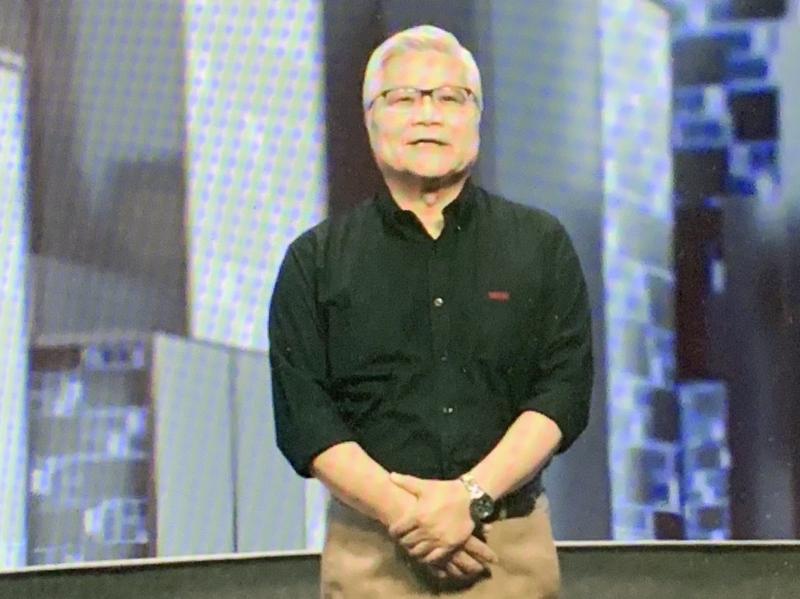Taiwan Semiconductor Manufacturing Co (TSMC, 台積電) yesterday unveiled the layout of its new fab in Arizona and reiterated its determination to ramp up advanced 5-nanometer chip production in 2024.
The company said that construction of Fab 21, in which it would invest US$10 billion to US$12 billion, has begun on a 445 hectare plot in Phoenix.
“As we expect demand for 5-nanometer [chips] will be strong and sustainable in the long term, we have made the Arizona fab, Fab 21, one of the 5-nanometer manufacturing sites,” TSMC chief executive officer C.C. Wei (魏哲家) told the company’s annual technology symposium.

Photo: Grace Hung, Taipei Times
The chipmaker has shipped more than 500,000 5-nanometer chips from its Fab 18 in Tainan since the technology became available last year, thanks to robust customer demand for smartphones, 5G applications, artificial-intelligence (AI) applications, networking devices and high-performance computing devices, Wei said.
The first phase of the Arizona fab would have an installed capacity of 20,000 wafers a month, TSMC said.
In January, the chipmaker said that further expansion would depend on market conditions and US government support.
TSMC yesterday introduced the technology for its new N5A process to produce 5-nanometer chips for automotive applications such as AI-enabled driver assistance and the digitization of vehicle cockpits.
Production using the N5A process is scheduled to be available in the third quarter of next year, Wei said.
The chipmaker said that its 3-nanometer technology would be the world’s most advanced technology when volume production begins in the second half of next year.
Its fabs in Tainan would be its major manufacturing sites for 3-nanometer chips, TSMC said.
To expedite mass production of 3-nanometer and 2-nanometer chips, TSMC is transforming its 2-nanometer research centers in Hsinchu into sites for initial production of new-generation chips, it said.
TSMC has been boosted capacity to catch up with customers' rising demand,expecting that its advanced technology capacity would expand at a compound annual rate of 30 percent from 2018 to this year.
Among advanced technologies,7-nanometer chip capacity would have increased fourfold until this year since 2018, TSMC senior vice president Y.P. Chin (秦永沛) told the symposium.
Five-nanometer chip capacity would quadruple until 2023 from last year’s level, he said.
The company is also expanding its advanced chip testing and packaging capacity to cope with growing demand, Chin said.
TSMC is building its fifth fab in Miaoli County’s Jhunan Township (竹南), which would offer the most advanced 3D packaging technology of system-on-integrated-chip in the second half of next year, he said.

SELL-OFF: Investors expect tariff-driven volatility as the local boarse reopens today, while analysts say government support and solid fundamentals would steady sentiment Local investors are bracing for a sharp market downturn today as the nation’s financial markets resume trading following a two-day closure for national holidays before the weekend, with sentiment rattled by US President Donald Trump’s sweeping tariff announcement. Trump’s unveiling of new “reciprocal tariffs” on Wednesday triggered a sell-off in global markets, with the FTSE Taiwan Index Futures — a benchmark for Taiwanese equities traded in Singapore — tumbling 9.2 percent over the past two sessions. Meanwhile, the American depositary receipts (ADRs) of Taiwan Semiconductor Manufacturing Co (TSMC, 台積電), the most heavily weighted stock on the TAIEX, plunged 13.8 percent in

A wave of stop-loss selling and panic selling hit Taiwan's stock market at its opening today, with the weighted index plunging 2,086 points — a drop of more than 9.7 percent — marking the largest intraday point and percentage loss on record. The index bottomed out at 19,212.02, while futures were locked limit-down, with more than 1,000 stocks hitting their daily drop limit. Three heavyweight stocks — Taiwan Semiconductor Manufacturing Co (TSMC, 台積電), Hon Hai Precision Industry Co (Foxconn, 鴻海精密) and MediaTek (聯發科) — hit their limit-down prices as soon as the market opened, falling to NT$848 (US$25.54), NT$138.5 and NT$1,295 respectively. TSMC's

ASML Holding NV, the sole producer of the most advanced machines used in semiconductor manufacturing, said geopolitical tensions are harming innovation a day after US President Donald Trump levied massive tariffs that promise to disrupt trade flows across the entire world. “Our industry has been built basically on the ability of people to work together, to innovate together,” ASML chief executive officer Christophe Fouquet said in a recorded message at a Thursday industry event in the Netherlands. Export controls and increasing geopolitical tensions challenge that collaboration, he said, without specifically addressing the new US tariffs. Tech executives in the EU, which is

In a small town in Paraguay, a showdown is brewing between traditional producers of yerba mate, a bitter herbal tea popular across South America, and miners of a shinier treasure: gold. A rush for the precious metal is pitting mate growers and indigenous groups against the expanding operations of small-scale miners who, until recently, were their neighbors, not nemeses. “They [the miners] have destroyed everything... The canals, springs, swamps,” said Vidal Britez, president of the Yerba Mate Producers’ Association of the town of Paso Yobai, about 210km east of capital Asuncion. “You can see the pollution from the dead fish.